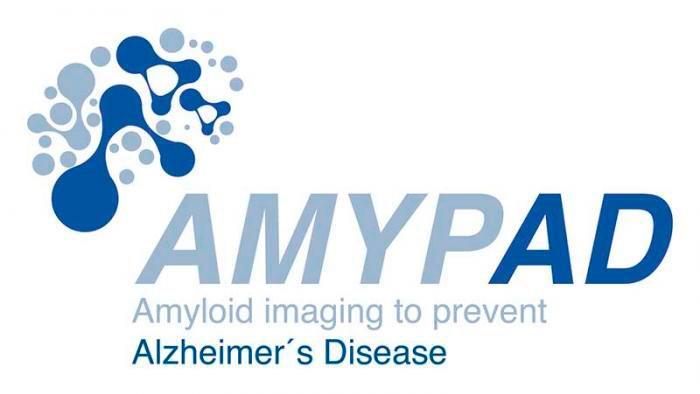30 Jun | 2022
The AMYPAD study performs amyloid PET tests on 840 European participants

Logo d'AMYPAD.
The European AMYPAD consortium, in which the Pasqual Maragall Foundation research center, the Barcelonaβeta Brain Research Center (BBRC), participates, has recruited and extensively analyzed amyloid PETs from 840 participants. The study, the AMYPAD Diagnostic and Patient Management Study, is the largest in Europe to assess the clinical utility and cost-benefit of this neuroimaging test.
The results have been published in the scientific journal Alzheimer's & Dementia. Together with the BBRC, European institutions from Genoa, Amsterdam, Toulouse, Cologne, London and Stockholm have participated in the project.
A commitment to amyloid PETs
The accumulation of amyloid protein plaques in the brain is one of the earliest and main neuropathological features of Alzheimer's disease. One of the techniques to measure the increase in this protein is positron emission tomography (PET) of amyloid.
“The AMYPAD Diagnostic and Patient Management Study is the largest study in Europe among those that implement the amyloid PET test in clinical practice”, explains Dr. Juan Domingo Gispert, head of the BBRC Neuroimaging Research Group, who leads the center's participation in AMYPAD. "This is a controlled, randomized, prospective and multicenter study, and its objective is to provide evidence on the clinical utility and cost-benefit of this test in Europe", continues Gispert.
Among the people who signed up for the study, 244 of them experienced subjective cognitive decline, a condition that produces a feeling of cognitive impairment even if it has not been confirmed clinically. Another 341 participants had mild cognitive impairment and 255 dementia. In all of them, Alzheimer's disease was suspected as the underlying cause.
Between April 2018 and October 2020, 840 participants were recruited from eight European memory clinics, centers created to offer evaluation or support programs for people with memory problems or cognitive function impairments.
Representative results to facilitate future research
The recently published study describes the sociodemographic and clinical characteristics obtained from the 840 participants, confirming that this sample is representative of the general memory clinic population. The data collected is consistent with similar clinical samples, both in terms of global cognition and age. "These data support the reliability and representativeness of the sample, suggesting that the results obtained will be generalizable to clinical practice," says Dr. Gispert. The main results of the study are expected to be published shortly, referring to the clinical utility of the test and, later, preliminary results on its cost-efficiency.
The Amyloid Imaging to Prevent Alzheimer's Disease (AMYPAD) study is a Europe-wide collaboration that has greatly improved understanding, diagnosis and treatment of Alzheimer's through the use of positron emission tomography. AMYPAD is made up of 17 European institutions, including research centers, pharmaceutical companies and patient associations. The data collected during this study and published now will constitute the largest and one of the best phenotypic memory clinical samples in Europe. This extensive database will be analyzed by different research groups inside and outside the AMYPAD Consortium to advance research against Alzheimer's and other neurodegenerative diseases.









